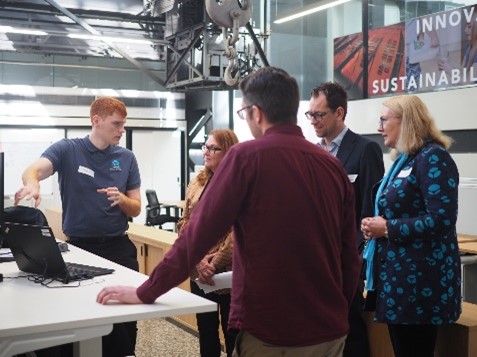White Box Enterprises: social enterprises are key to success for people facing job challenges

Getting a job in Australia can be tough. If you’re a First Nations person, living with a disability, a newly arrived Australian or an ex-offender, it’s much tougher. But social enterprise incubator White Box Enterprises is fast developing a track record of start-up successes that are opening up the job market to people who had been facing barriers – one of which has just attracted a $5 million boost in funding from the Paul Ramsay Foundation.
Despite the Federal Government’s best efforts, our employment system continues to fall short when it comes to providing meaningful work and career pathways for many of these individuals.
According to White Box Enterprises founder Luke Terry, social enterprise is what we should be focusing on.
“Our country will spend about $3 billion a year helping people get back to work and the success rates for people who haven’t had a job for nine out of the last 12 months is less than 30%,” he says. “We know social enterprises have 80%-plus success rates, are financially resilient and can be focused on every dollar going back into creating employment for those at most need.”
Luke spent five years in the UK building social enterprises in collaboration with local government. When he returned to Australia in 2009, he was determined to create a similar jobs market on home soil for overlooked Australians.
With key support from philanthropy, in particular The Ian Potter Foundation and the Queensland State Government, Luke launched a social enterprise commercial laundry in Toowoomba, known as Vanguard Laundry.
The aim was simple – to create a viable business that meets an unmet need while creating jobs for people with a lived experience of mental illness. The laundry is one of the great success stories of social enterprise in the country, made possible through philanthropy.
It was here Luke discovered both the challenges and opportunities of a jobs-focused social enterprise, and realised he wanted to do more. Together with Lisa Siganto, he launched White Box Enterprises in 2019 to systematically address the constraints he faced with Vanguard and other social enterprises including access to affordable space, catalytic capital and partnerships. The aim was to help mainstream jobs-focused social enterprise in Australia.
The Ian Potter Foundation was one of the first supporters, providing White Box with a $2.5 million capacity-building grant over five years, as well as ongoing mentoring from one of the Foundation’s most senior program managers, Dr Alberto Furlan.
“The Foundation first supported White Box Enterprises through a multi-year $450,000 grant in 2020 to help the organisation develop its social enterprise pipeline. This work progressed very well.
“However, it was clear that White Box Enterprises was at a critical point and needed consistent medium-term capacity-building funding to grow and diversify its business income streams. To support that growth and in recognition of White Box Enterprises’ proven success at incubating new social enterprises, the Foundation extended its support with a $2.5 million capacity-building grant over five years in 2021,” says Alberto.
“White Box wouldn’t be here today if it wasn’t for The Ian Potter Foundation. The team not only sees the impact social enterprises can create, they understand the cost constraints and the need for innovation in this space,” says Luke.
“To create an entirely new social enterprise requires time, resourcing and some trial and error. You have all the usual start-up business expenses, wages and challenges. On top of this, you also have the cost of wrap-around supports that are critical to a social enterprise. Building these businesses relies heavily on philanthropic support, but we are working to change this.”
One of White Box’s three strategic priorities is innovation and systems change. White Box is running Australia’s first payment by outcomes trial for jobs-focused social enterprises in partnership with the Department of Social Services, where social enterprises are receiving direct payments from the government for the job outcomes they create.
Early findings show people living with a disability are twice as likely to stay in their job and earn 28% more when employed by a jobs-focused social enterprise, compared to a job placement through Disability Employment Services (DES).
“Based on this data and the anticipated outcomes of the Payment by Outcomes trial, we’re asking government to look more closely at social enterprise and the role it can play in the national employment services system,” says Luke.
“We’re not suggesting social enterprise replace DES or Workforce Australia. We see social enterprise sitting alongside these, as an alternative for people who need that extra level of support that open employment doesn’t provide.”
Alongside government advocacy, building social enterprises from the ground up is another key priority for White Box made possible through philanthropy. The organisation has launched four social enterprises, including Australian Spatial Analytics. Arguably the fastest growing jobs-focused social enterprise in Australia, this technology service provider employs more than 100 individuals, 80%of whom are neurodiverse.
“We’re really proud of what we have achieved over the last four years, none of this would have been possible without The Ian Potter Foundation and many other foundations. Core funding is hard to find, but it’s this that allows us to try new things and break new ground,” says Luke.